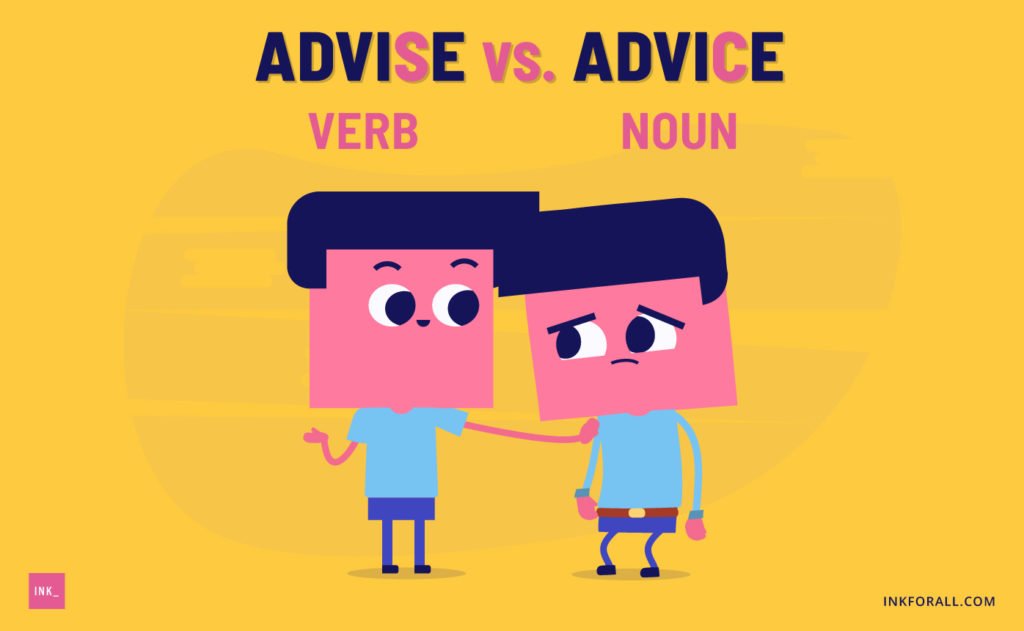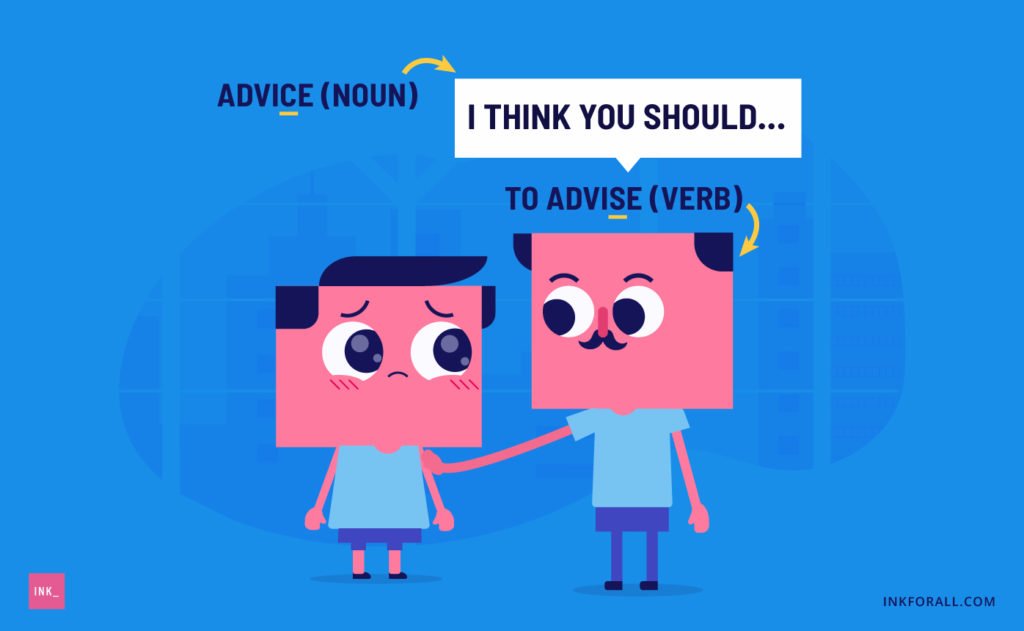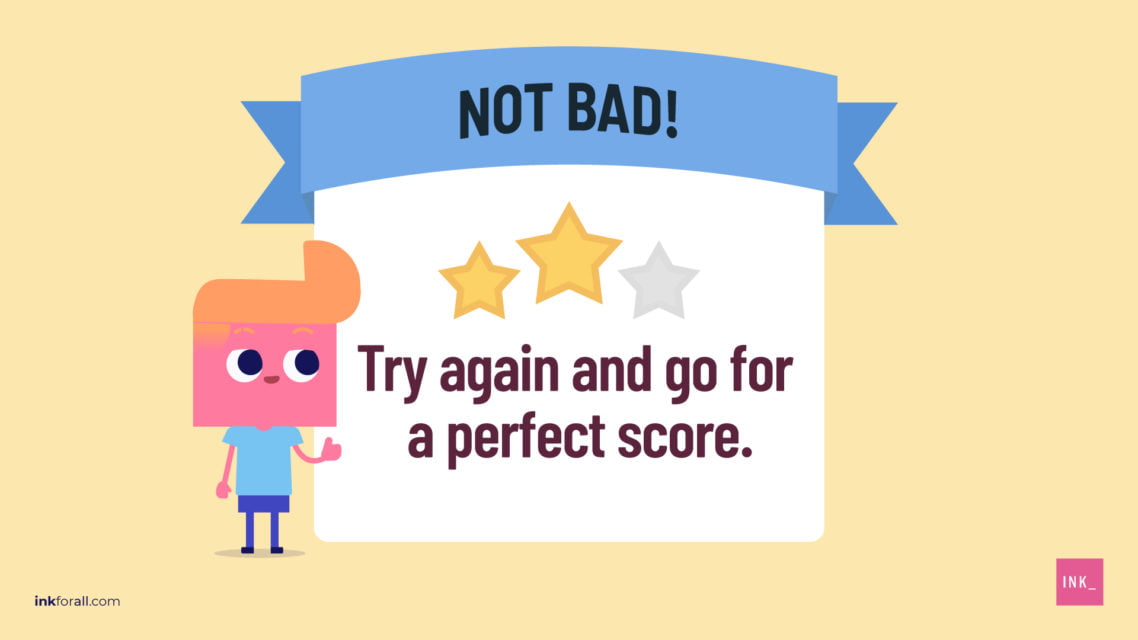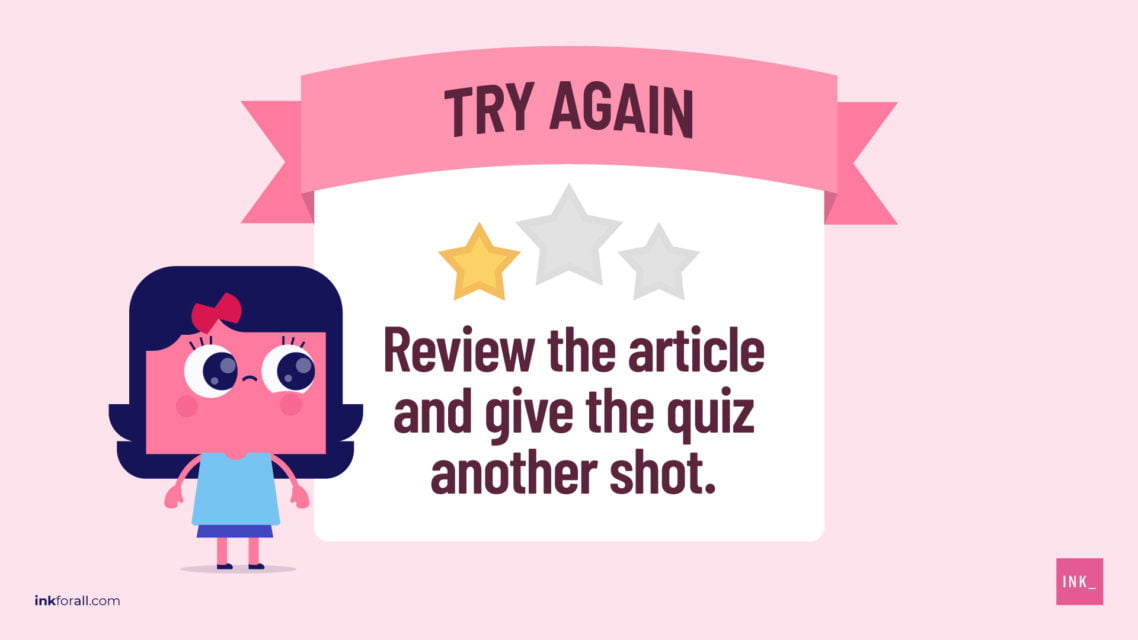
Разумеется, первое отличие в написании — advice [əd’vaɪs] –пишется с буквой «c» в конце слова и является существительным, не имеющим формы множественного числа. Кто дает нам советы? Помимо дружеского совета можно получить консультацию юриста, (legal advice) врача (doctor’s advice). И поскольку мы сказали, что это существительное всегда стоит в единственном числе, оно будет сочетается с глаголом в форме единственного числа:
- John gave me some useful advice – Джон дал мне несколько дельных советов
- I met my lawyer to get his advice on the subject that interests me – я встретился со своим адвокатом чтобы получить консультацию по интересующему меня предмету
- According to doctor’s advice I should swallow those tablets the whole month – согласно совету врача я должен глотать эти таблетки целый месяц.
Выучим фразы со словом advice, которые нам пригодятся
Если же нужно подчеркнуть, что совет именно один, можно использовать фразу a piece of advice:
- Let me give you a piece of advice.
Advise — советовать, рекомендовать
Что касается глагола to advise [əd’vaɪz] он пишется с буквой s на конце слова и переводится как «советовать, рекомендовать»
- As your doctor I advise you to stay in bed – Как ваш доктор я советую вам оставаться в постели
- Before I take any decision I’ll advise with my parents – Прежде чем принять решение, я посоветуюсь со своими родителями.
- Which of the book would you advise me to buy? –Которую из книг вы посоветуете купить?
- Глагол to advise используется также в значении «извещать, уведомлять, сообщать»
• Please advise us of the date of the meeting – Сообщите о дате встречи, пожалуйста
• He advised the police about the lost child – Он сообщил в полицию о потерявшемся ребенке - Если вы указываете, по какому вопросу даете совет или рекомендацию, используйте предлог on, а если нужно сказать, что напротив, вы не советуете выполнять что-либо, используйте предлог against :
• He advised me on housekeeping – Он дал мне советы по домашнему хозяйству
• She advised me against buying those flowers – Она отговорила меня покупать эти цветы - Такое предложение как «Он посоветовал мне купить синий костюм» можно перевести на английский язык, используя оба слова advice и advise:
• He advised me to buy a blue suit.
• He gave me advice to buy a blue suit.
Главное – знать, как построить предложение с каждым из этих слов.
А теперь предлагаем вам пройти небольшой тест на эту тему.
Advice or advise
1. Your … was very useful, thank you.
a. advise
b. advices
c. advice
2. He … me … cooking a very good salad.
a. advised, on
b. adviced, on
c. advised, against
d. adviced, against
3. The lawyer … me in the subject I was interested in.
a. adviced
b. advises
c. advised
4. If you follow your doctor’s … you will recover soon.
a. advise
b. advices
c. advice
5. Mother … making friends with those guys. They are known to be a bad company.
a. advised on
b. adviced on
c. advised against
d. adviced against
6. It is just a piece of friendly … you needn»t follow it if you don»t like.
a. advice
b. advise
c. advices
7. Would you please … me of the forthcoming meeting?
a. advice
b. advising
c. advise
8. Please let me know as soon as you are … of the results.
a. adviced
b. advise
c. advised
9. Do you know anyone who can give me some professional … on divorces?
a. advice
b. advise
c. advices
10. Your misleading … resulted in problems for me.
a. advise
b. advices
c. advice
Main Advise vs. Advice Takeaways:
- Adviceand advisesound similar, but they’re not the same.
- Advice is a noun, while advise is a verb.
- You can giveadvice to someone, or you can advise someone.
- Please advise or kindly advise are requests for information. Some people don’t mind these phrases, while others consider them abrupt or passive aggressive.
- Please be advised is a phrase used to share information with a formal tone.
Do you advice someone, or do you advise them? Do you receive advise or advice? Although the English language makes a distinction between advise and advice, it is not always easy to tell the difference because they are both commonly used in everyday conversations. However, understanding the difference between advice vs. advise is the key to knowing how each word should be used. In this post, we’ll cover the difference between these two words plus when and how you should use them.
What’s the Difference Between Advice and Advise?
On the surface, advice and advise sound the same, but they are actually different in meaning. Besides their difference in spelling and pronunciation, they also answer different questions. Advice (c pronounced as s) is a noun. It refers to the opinion or suggestion that you give or receive from someone. Advise (s pronounced as z), on the other hand, is a verb. It refers to the actual act of giving information and guidance to someone.
Do You Advise or Advice?
You can advise (with an ‘s‘) because advise is a verb. You can’t advice (with a ‘c‘) because this word is a noun. In other words, advice is a noun — it’s a thing.Advise is a transitive or an intransitive verb — it’s a “doing word.” You can’t chair someone, but you can give them a chair. Similarly, you can’t advice someone, but you can give them advice.
Advice vs. Advise Pronunciation Guide
These two words look alike, but they sound different when spoken aloud.
👀 On one hand, the ‘s‘ in advise is almost pronounced like a ‘z‘ (add-VYZ). If it rhymes with the word “eyes,” you know you’re pronouncing advise correctly.
🧊 On the other hand, the ‘c‘ in advice is pronounced like an ‘s‘ (add-VICE). If it rhymes with the word “ice,” you know you’re pronouncing advice correctly.
How Do You Use Advice and Advise in a Sentence?
Here are the best examples of how to use advice and advise in a sentence:
Is Please Advise Rude?
The phrase “please advise” is a succinct request for information or guidance, and isn’t necessarily rude. However, it depends on the context as well as the speaker’s tone, intention, and style. For instance, some may take it as too short, blunt, demanding, or even passive aggressive. Moreover, some consider it redundant and would prefer a direct question. On the other hand, it can also stand in for “let me know” (Should you have any questions, please advise).
Let’s look at a few examples of “please advise” in action:
In the first instance, “please advise” comes across as benign and a little dry, but not rude. In the second instance, the reader knows they’re in trouble. Tone can be hard to read via email, so if you’re in doubt, use a different phrase.
What is Another Word for Advice?
Here are other names and synonyms for the noun advice:
- Guidance
- A recommendation/some recommendations
- Input
- An opinion/your opinion
- Some help
- A suggestion/some suggestions
- A tip/some tips
- A word of wisdom
- Some pearls of wisdom
Advise vs. Advice Recap
Is it advice or advise?Advise and advice are two words that frequently cause authors confusion. Notwithstanding, advise and advice play slightly different roles: they’re similar — but they’re not the same. For instance, you can advise someone, or you can give them advice.
When to Use Advice (with a ‘c’):
- When you need a noun, use advice.
- Advice is a noun, or an object, like a cupcake. You give someone advice; you give someone a cupcake.
When to Use Advise (with an ‘s’):
- When you need a verb, use advise.
- To advise is a verb that means to give advice.
- You advise someone; you direct someone.
Feeling clearer about advise vs. advice? Test your grammar knowledge with our quick quiz below.
Advice and Advice Question #1
Correct!
Wrong!
The answer is FALSE. Although «advice» and «advise» sound similar, they’re not the same.
Advise or Advice Question #2
Correct!
Wrong!
The answer is B. «Advise» functions in a sentence as a verb.
Advice or Advise Question #3
Correct!
Wrong!
The answer is B. «Advise» means to give a recommendation.
Advice vs Advise Question #4
Correct!
Wrong!
The answer is B. The “s” in “advise” is almost pronounced like a “z.”
Advice and Advise Question #5
Correct!
Wrong!
The answer is A. «Advice» refers to the suggestion or a recommendation itself.
Advise vs Advice Question #6
Correct!
Wrong!
The answer is FALSE. «Please advise» is a concise request for information.
Advise vs. Advice Quiz Result
Expert!
Not bad!
Almost got it! Review the article and try again.
Read More: 📊 Than vs. Then ⏰ How to Tell the Difference Once and for all
Сегодня мы поговорим о словах advice и advise. Как видите, они различаются только одной буквой. Что же будет, если перепутать их? Скажем так, их значение очень близко, поэтому понимание вряд ли пострадает, но грамматическая ошибка будет точно. Итак, давайте разберемся, что же из них что.
Advice
Произношение и перевод:
Advice [ədˈvaɪs] / [эдв`айс] – совет
Значение слова: Рекомендация по поводу того, что делать в той или иной ситуации.
Употребление
Обратите внимание: это слово в английском языке неисчисляемое! То есть:
- Его невозможно поставить во множественное число: «advices» не существует!
- Его невозможно использовать с артиклем a/n — «an advice» тоже сказать нельзя!
Например: Я всегда хожу к Саре за советом (advice). На твоем месте я бы не следовал этому совету (advice).
Если же вы хотите «посчитать» советы, то используйте фразу: piece of advice, буквально «кусочек совета».
Например: Друг дал мне пару советов (two pieces of advice). У меня есть для тебя один советик (one piece of advice).
Пример:
I need to ask my doctor’s advice before taking these meds.
Мне нужно спросить совета у своего врача, прежде чем принимать эти лекарства.
Take my advice: nothing good will come out of it
Послушай мой совет: это до добра не доведет.
Хотите заговорить на английском?
Приходите на наш бесплатный онлайн мастер-класс «Как довести английский язык до автоматизма»
Подробнее
Также Вы можете ознакомиться со всеми онлайн-курсами английского языка.
Advise
Произношение и перевод:
Advise [ədˈvaɪz] / [эдв`айз] – советовать, давать совет/рекомендацию
Значение слова: Давать рекомендации по поводу того, что делать в той или иной ситуации
Употребление:
Например: Я советую тебе (advise you) принять меры предосторожности. Я не могу давать тебе рекомендации (advise you) в этих вопросах, потому что я не специалист.
Если вы советуете что-то НЕ делать, то используйте advise со словом against ([əˈgɛnst]/[эг`енст] «против»). Обратите внимание, что следующее после advise against действие будет с -ing!
Например: Консультант не советовал (advised against) нам продавать дом в кризис. Я не рекомендую (advise against) этот отель.
Пример:
My trainer advised me to be careful while exercising.
Мой тренер советовал мне быть осторожным во время упражнений.
Normally I would advise against rash decisions, but this situation requires quick action!
Обычно я бы не рекомендовал поспешное решение, но это ситуация требует быстрых действий!
В чем разница?
Advice — это «совет», то есть, существительное (предмет)! Например: Мне не нужны твои советы (advice). Я прочел этот совет (advice) в интернете.
Advise — это «советовать», то есть, глагол (действие)! Например: Адвокат посоветовал (advised) нам воздержаться от комментариев. Они посоветовали мне (advised me) взять с собой паспорт.
Как я уже говорила: понять вас поймут, однако перепутать эти слова будет все равно ошибкой. Обратите внимание также на то, что они не только пишутся по-разному, но и произносятся! Так что и в устной, и в письменной речи я вам советую (I advise you) быть с ними аккуратными.
Задание на закрепление
Вставьте правильные слова в следующие предложения. Свои ответы оставляйте в комментариях.
1. Метеорологи ___ не ходить под деревьями.
2. Послушай Джона: он не ___ плохих вещей.
3. Я ___ продумать маршрут заранее.
4. У меня есть ___, который точно тебе поможет.
5. Я последовал твоему ___ и сделал все, как ты сказал.
6. Том вечно везде лезет со своими ___!
Have you ever gotten the two words ADVISE and ADVICE confused? Since they only differ by one letter and have similar meanings, knowing how to tell them apart can be tricky. But not to worry – the difference between them is quite simple.
PRONUNCIATION
To start, ADVISE and ADVICE are not pronounced the same way. If you see an S, pronounce it like the voiced [z] sound, as in BUZZ or LIES. If you see a C, on the other hand, pronounce it like the unvoiced [s] sound, as in BUS or LICE.
PARTS OF SPEECH
In addition, ADVICE is a noun, while ADVISE is a verb. For example, you could advise someone to do something, or you could give them advice. ADVICE means a suggestion, a recommendation, or guidance to do something specific.
If you’re friend is struggling in a relationship, maybe they could benefit from some relationship advice. To ADVISE somebody means to give them ADVICE. Perhaps your friend might appreciate it if you ADVISED them to take a certain course of action.
I gave him my word of ADVICE, not that he’s going to listen to me. (ADVICE = noun)
Driving under the influence certainly isn’t ADVISED, for obvious reasons. (ADVISE = verb)
Could I have some ADVICE about what to wear tonight? (ADVICE = noun)
My mother always tries to ADVISE me on things she knows nothing about. (ADVISE = verb)
ADVICE
Now that we’ve seen examples of each word, let’s look into them in more detail, starting with the word ADVICE.
There are certain verbs that you can use with ADVICE. For example, you can GIVE advice to someone else, RECEIVE advice from someone in return, or HAVE advice about something in general. If you want to do what the advice tells you to do, you can LISTEN TO or FOLLOW such advice.
- Don’t listen to Maddie. She tends to GIVE very bad ADVICE.
- There’s a difference between RECEIVING advice and actually FOLLOWING it.
- Do you ever LISTEN to my advice?
- I thought I had good ADVICE to give him, but it turns out I’m clueless about his situation.
The two prepositions mainly used with ADVICE are ON and ABOUT. These point to the topic that the advice pertains to. Meanwhile, you can use the preposition OF if you want to say whom the advice came from.
- How does Jason have any ADVICE ABOUT love? He’s never been in a relationship!
- I think I need some ADVICE ON how to study better for my classes. (Notice that you can follow this phrase with an indirect question. In this case, it begins with the word HOW.)
While you can use the word ADVICE by itself, it’s also common to use the phrase A WORD OF ADVICE, or A PIECE OF ADVICE. Both are used more or less interchangeably.
- My friend gave me a decent PIECE OF ADVICE a while ago about life: If you’re not happy, it’s not worth it.
- Any last WORD OF ADVICE before I head off for my interview?
- A WORD OF ADVICE: If he brings up marriage, run.
Certain compound words can also be formed with the word ADVICE in order to indicate advice about a certain subject. Here are some common ones:
Relationship advice: I’m in desperate need of some RELATIONSHIP ADVICE right now.
Life advice: If you could give your past self one word of LIFE ADVICE, what would it be?
Career advice: Shane told me he sometimes likes to go to a psychic for CAREER ADVICE.
Legal advice: If I end up going to court, I’m going to need some major LEGAL ADVICE.
Spiritual advice: A pastor may be good for SPIRITUAL ADVICE, but I would draw the line there.
ADVISE
Let’s move on to ADVISE, which is the verb form of ADVICE. You can either advise someone TO DO something, or advise them NOT TO DO something. The formula for this looks like this:
TO ADVISE + person + (NOT) TO DO…
I ADVISE you TO RESEARCH the position before you apply for it.
My coach ADVISED me NOT TO STRETCH before warming up.
What would you ADVISE me TO DO in this situation?
Alternatively, you could follow the word ADVISE with a subordinate clause beginning with the word THAT.
- The mayor ADVISES THAT everyone stay indoors during the huge snowstorm this weekend.
- I remember the teacher ADVISED THAT we read the textbook before coming into class.
- Normally, I would ADVISE THAT you show up to work even when sick, but maybe you should stay home.
It’s also possible to indicate that people in general ADVISE something without naming who specifically is giving the advice. For this, it’s best to use the passive voice (i.e., TO BE + ADVISED)
- It’s generally ADVISED not to drink while you’re on antibiotics.
- This brand seems to be ADVISED especially for kids.
- Is it ADVISED to show up to an interview in business casual?
If you want to indicate the general subject of the advice rather than what the advice is specifically, you can use ADVISE with the prepositions ON or ABOUT.
- My counselor ADVISED me ON which majors were best suited for me.
- As opposed to: My counselor advised me to become a biology major.
- I feel like I’ve never been well ADVISED ABOUT anything related to money.
- As opposed to: I feel like I’ve never been advised to save more and spend less.
- Her parents have ADVISED her ABOUT picking boyfriends since she came out of the womb.
Finally, you can use the phrase ADVISE OF. However, this has more of a meaning of informing someone of something rather than giving them advice about something.
- If you’re not sure what to do with your life, I can ADVISE you OF your choices, but I can’t make a decision for you.
- He ADVISED her OF how long the flight would be to Asia, but she appeared undeterred.
- My boss will ADVISE me OF the procedures for tasks twice before getting impatient.
RELATED WORDS
There are several words that are related to ADVICE and ADVISE. For example, an ADVISER (also spelled ADVISOR) is someone whose job it is to give people advice, especially in a school or college setting.
Meanwhile, an ADVISORY is a report or announcement detailing certain advice a person or group of people. The word ADVISORY can also be an adjective to describe something that pertains to advice.
A: I’m not sure what classes I should take next semester.
B: Really? Have you talked to your ADVISER about it?
- Tonight, we’re holding an ADVISORY session for anyone looking for career advice.
- There was a recent ADVISORY in the news not to travel to countries affected by the Zika virus.
More for you:
20 Keywords for Giving Advice and Making Suggestions
How to Speak English Fluently? 2 Unusual Tips – MyEnglishTeacher.eu
How to Learn English? 3 Unbelievable Advice You Can Implement
When considering advice vs advise, writers need to know that these are not synonyms, and are actually different parts of speech.
The words “advice” and “advise” look very similar, but that one simple spelling change, the “c” into an “s” changes the word completely. Not only are these two words pronounced differently, but they are also different parts of speech.
Yet the fact that these words look and sound so similar and show up in the same context often make them easy to mix up. Good writers need to understand the difference between advice vs. advise if they will create meaningful, understandable writing.
Best Grammar Checker
Grammarly
Grammarly is a top spelling, grammar and plagiarism checker. It’ll help you find and fix errors fast, and it works everywhere. It’s trusted by millions of writers for a reason.
Become a Writer Today is reader-supported. When you buy through links on our site, we may earn an affiliate commission.
Contents
- Advice vs Advise – Understanding the Differences
- American English vs British English
- The Final Word on Advice vs Advise
- FAQs on Advice vs Advise
- Author
Advice vs Advise – Understanding the Differences
According to the Merriam-Webster Dictionary, “advice” with an -ice is a noun that means “recommendation regarding a decision or course of conduct.” The dictionary defines advise with an -ise as a verb that means “to give a recommendation about what should be done” or “to give advice.”
Based on these two definitions, writers can easily see why these land on lists of commonly confused words in American English.
A Closer Look at the Noun Advice
“Advice” with a c is a noun. The -ice ending sounds like the word “ice.” It most commonly refers to recommending a course of action or conduct, but it can also be used to mean an official notice.
Here are some example sentences using “advice” as an uncountable noun.
- He gave advice about how to win the girl’s affection.
- The teacher gave the students some advice on how to study for the exam.
“Advice” can also be a countable noun, but in this case, it is always paired with “piece of,” as in:
- Let me give you a piece of advice about going to college.
Finally, the plural of “advice” can refer to official government recommendations or statements, such as:
- The official advices from the CDC recommend avoiding unnecessary travel to countries where illness is prevalent.
A Closer Look at the Verb Advise
Advise with an -ise ending sounds like “ize.” This verb means to give advice to someone. So, you could advise someone with your best piece of advice.
Here are some examples of advise used correctly:
- He advised the students about what time to come to class to avoid late marks.
- She was willing to advise her understudy about the best way to tackle the scene.
Because it is a verb, advise can also be a participle, which is a verb ending in -ing or -ed that acts as an adjective. This might look like:
- The advising attorney recommended the prosecution push for stronger charges.
American English vs British English
The advice vs. advise conundrum comes largely from the differences in spelling between British English and American English. In British English, many words that have both a verb and a noun form change between the “s” and “c” to distinguish. For example, “practice” is a noun while “practise” is a verb.
This is not the case in American English, where both the noun and verb form of the word end in -ce. Thus, American writers get confused when presented with advice and advise.
The same thing is true for the words “device” and “devise,” which are less often confused. Again, the -ice ending is the noun form and the -ise ending is the verb form. If writers can remember these two and keep them separate, then advice vs advise becomes much easier.
The Final Word on Advice vs Advise
Keeping “advice” and “advise” straight is fairly simple. The -ice ending sounds like “ice” and is a noun, while the -ise ending sounds like “ize” and is a verb. This is always the case, without exception, and that makes the differentiation between the two very simple.
Learning this rule will help you avoid problems from these commonly confused words in your own writing.
FAQs on Advice vs Advise
Are “advice” and “advise” interchangeable?
No, “advice” is always used as a noun, whereas “advise” is always used as a verb. Thus, because they are different parts of speech, they are not interchangeable.
Can “advise” take the role of a participle?
Yes, advise can be a participle to describe a noun. The sentence “The advising professor recommended adding another history course” uses it this way.
Join over 15,000 writers today
Get a FREE book of writing prompts and learn how to make more money from your writing.
-
Nicole Harms has been writing professionally since 2006. She specializes in education content and real estate writing but enjoys a wide gamut of topics. Her goal is to connect with the reader in an engaging, but informative way. Her work has been featured on USA Today, and she ghostwrites for many high-profile companies. As a former teacher, she is passionate about both research and grammar, giving her clients the quality they demand in today’s online marketing world.
View all posts















